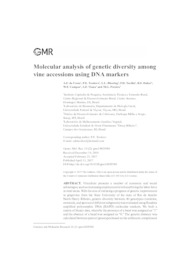Molecular analysis of genetic diversity among vine accessions using DNA markers.
Molecular analysis of genetic diversity among vine accessions using DNA markers.
Autoria: COSTA, A. F. da; TEODORO, P. E.; BHERING, L. L.; TARDIN, F. D.; DAHER, R. F.; CAMPOS, W. F.; VIANA, A. P.; PEREIRA, M. G.
Resumo: Viticulture presents a number of economic and social advantages, such as increasing employment levels and fixing the labor force in rural areas. With the aim of initiating a program of genetic improvement in grapevine from the State University of the state of Rio de Janeiro North Darcy Ribeiro, genetic diversity between 40 genotypes (varieties, rootstock, and species of different subgenera) was evaluated using Random amplified polymorphic DNA (RAPD) molecular markers. We built a matrix of binary data, whereby the presence of a band was assigned as "1" and the absence of a band was assigned as "0". The genetic distance was calculated between pairs of genotypes based on the arithmetic complement from the Jaccard Index. The results revealed the presence of considerable variability in the collection. Analysis of the genetic dissimilarity matrix revealed that the most dissimilar genotypes were Rupestris du Lot and Vitis rotundifolia because they were the most genetically distant (0.5972). The most similar were genotypes 31 (unidentified) and Rupestris du lot, which showed zero distance, confirming the results of field observations. A duplicate was confirmed, consistent with field observations, and a short distance was found between the variety "Italy" and its mutation, "Ruby". The grouping methods used were somewhat concordant.
Ano de publicação: 2017
Tipo de publicação: Artigo de periódico
Unidade: Embrapa Milho e Sorgo
Palavras-chave: Análise molecular, Marcador molecular, Variação genética, Videira
Observações
1 - Por padrão são exibidas publicações dos últimos 20 anos. Para encontrar publicações mais antigas, configure o filtro ano de publicação, colocando o ano a partir do qual você deseja encontrar publicações. O filtro está na coluna da esquerda na busca acima.
2 - Para ler algumas publicações da Embrapa (apenas as que estão em formato ePub), é necessário ter, no celular ou computador, um desses softwares gratuitos. Sistemas Android: Google Play Livros; IOS: iBooks; Windows e Linux: software Calibre.
Acesse outras publicações
Acesse a Base de Dados da Pesquisa Agropecuária (BDPA) para consultar o acervo completo das bibliotecas da Embrapa.

